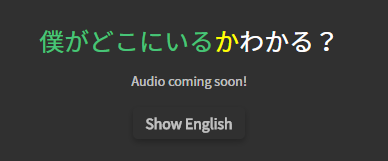including questions within sentences
Structure
- Question-phrase + か + わかる, おぼえていない, しっている, etc.
 Do not attach だ or です to nouns or な-adjectives preceding か
Do not attach だ or です to nouns or な-adjectives preceding か
[Questions within sentences are in short form・だ is usually dropped after a な-adjective or noun and before か・かどうか is used when the question word is not present and in ‘if/whether or not’ questions]
僕がどこにいる か わかる?




